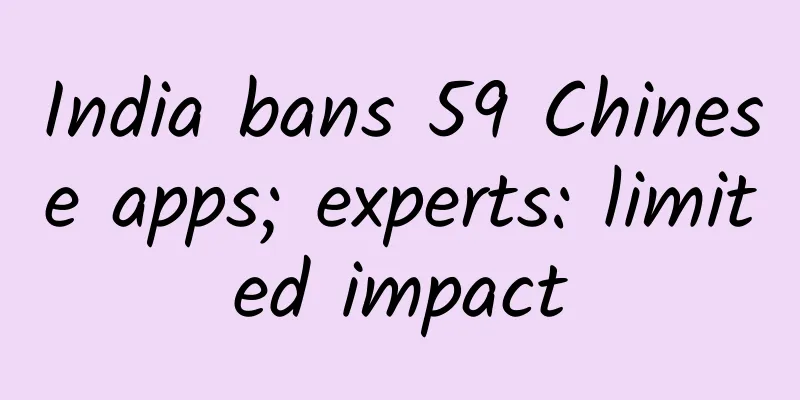India bans 59 Chinese apps; experts: limited impact

|
On June 30, India banned 59 Chinese apps for security reasons, but an Indian netizen told Beijing Business Daily that "not all of the 59 apps involved have been removed from the shelves, and Indian users can use the downloaded apps normally." The Chinese apps involved this time are of a wide range of product types and fields, including products from leading Internet companies such as BAT, Lenovo, and ByteDance, as well as apps from mid-tier companies such as Joyy Group and Meitu. Although the crackdown seems to be widespread, due to the limited Indian Internet market, the impact of this incident on Chinese Internet companies is not significant. Putting aside political factors, the cultural differences and legal risks faced by Chinese Internet companies going overseas have always been a sword of Damocles hanging over their heads. "Disable" does not stop deactivation In the early morning of June 30, the Indian Ministry of Information Technology banned 59 Chinese applications on security grounds, including TikTok, Eggplant Quick Transfer, UC Browser, WeChat, QQ, Kuaishou and Meitu, covering short video, live broadcast, beauty, game, e-commerce, music and news aggregation apps. Although some products are not well-known, their market share in India is not low. "For example, Lenovo's Eggplant Quick Transfer, a tool app, has a high usage rate in India, and Helo and Likee have also been on the popular list of local Android apps in India," Ding Jiale, founder of volanews, an overseas media that focuses on emerging market technology venture capital trends, told Beijing Business Daily. Zhang Yi, CEO of iMedia Consulting, believes that "more attention should be paid to the impact on ClubFactory and UC Browser. ClubFactory is currently one of the three major e-commerce platforms in India, and the browser plays a solid role as a traffic entrance in emerging markets such as India." However, in Zhang Yi's view, TikTok is currently one of the major head applications that have been removed from the shelves, but the impact remains to be seen. According to SensorTower data, as of April 30, 2020, India was the market with the largest number of TikTok downloads, contributing more than 600 million downloads, accounting for nearly 30% of the global total downloads. According to media reports, after India officially announced the banned list, TikTok quickly responded that it would "continue to comply with data security requirements under the Indian legal framework." However, this statement has not been confirmed by TikTok's parent company ByteDance. As of press time, the other apps involved in this incident have remained silent. Indian users confirmed to the Beijing Business Daily reporter that "TikTok has been removed from the Indian market, and some were removed long before the promotion. However, Newsdog, WeMeet, WeChat, etc. can still be searched in the app stores in India. If users have already downloaded these apps, they can still use them normally. These apps have only lost new users." More symbolic meaning Even though some apps have a large scale in the Indian market, industry insiders generally believe that the ban will have limited impact on the Chinese Internet companies behind the above apps, and there is a lot of data to support this view. Bai Bin (pseudonym), who has been paying close attention to overseas marketing for a long time, told the Beijing Business Daily reporter that "Currently, not all of these 59 apps have entered the monetization stage, and they are more focused on accumulating users." Taking the most common advertising monetization model on the Internet as an example, relevant reports show that the size of India’s entire advertising market in 2020 was approximately US$8 billion (approximately RMB 56.6 billion excluding exchange rate fluctuations), of which digital advertising accounted for 11%, or US$880 million (approximately RMB 6.2 billion excluding exchange rate fluctuations). According to data released by iResearch in April 2020, the size of China's online advertising market was 121.21 billion yuan in the first quarter of 2020, far higher than the size of India's entire advertising market in 2020. From the perspective of ARPU (average revenue per user), the gap between India and the international level is also very obvious. In 2019, Google's advertising revenue was 134.8 billion US dollars, nearly half of which came from the US market, with an average contribution of 1,568 yuan per US Internet user. India is the number one market for Google mobile store app downloads, but it can only generate an average of 8.6 yuan in revenue per Android user in India each year. The news from Indian netizens also pointed out that "In fact, several of the apps banned this time have stopped updating, such as Baidu's. Some products will be exposed every time they involve sensitive issues such as security." However, as to whether the Baidu apps involved in this ban have stopped updating, Baidu said "there is no response yet." "Overall, this ban in India will have an impact on a few individual apps, but it will basically not have a fatal blow to the parent companies of these 59 products. Whether for China's top Internet companies or mid-tier companies, having the Indian market is icing on the cake, and there is no need to worry about losing the Indian market," Zhang Yi said frankly. The difficulties in going overseas are still difficult to solve The overseas expansion of Chinese Internet companies is a topic that is often discussed. In 2018, the overseas expansion entered a period of explosive growth. The scale of overseas e-commerce grew by 26% in the first half of 2018, and the overseas game growth rate was 15.8% throughout the year. The demand for tool applications was strong and they were transformed into social service applications. Content products such as live broadcast, short video, and information continued to be popular. According to Mobvista data, as of 2017, 2,268 apps from 720 companies had been exported. In 2020, more and more Internet companies continue to look overseas, and emerging markets such as India, Southeast Asia, the Middle East, and Africa continue to be hot. These regions have a large population, a younger structure, and a fast growth rate of Internet development. At the same time, the national economic level and political situation are improving. The valuation and market share of leading companies are still relatively small. They are the traffic depressions targeted by Chinese companies going overseas. From Chinese Internet companies trying their hand at overseas business to going overseas becoming a standard practice for large enterprises, they cannot escape the issues of cultural differences and localized operations. Zhang Yi suggested to Chinese Internet companies that "the labor force and managers of overseas apps should preferably be locals, and they should contribute taxes to the local area instead of rushing to transfer profits to the domestic market. Even if the scale of technology companies' employees will not be too large, they should also consider whether they have solved local employment problems." Back to India's ban on Chinese apps, Zhang Yi emphasized, "From a global perspective, China's mobile Internet application, innovation and operation capabilities are far ahead. India should not only look at the market share occupied by Chinese apps, but should pay more attention to the impact of Chinese apps on India's new economy, new technology and innovation." |
<<: What technology will Apple's 5G iPhone 12 use? There are still different opinions
>>: The 4G version of iPhone 12 is a "must-have" for consumers, and it is also Apple's "firefighter"
Recommend
The world's largest bacteria has been discovered! It's bigger than a mosquito!
Review expert: Ji Shi Life Field Observer There a...
One lie down, two clap, three roll, fall into the ice hole, remember this can save your life →
On December 10, a middle school student in Fushun...
How difficult is the new model Google is seeking?
In the early morning of October 5th, Beijing time...
Sunglasses should be replaced every 2 years, otherwise it’s the same as not wearing them?
gossip “Do I need to replace sunglasses every two...
What happened in the past two years when Twitter’s stock price was halved and Weibo’s stock price doubled?
Twitter is in dire straits, while the latest fina...
5 formulas to analyze the growth secrets of soul APP
As a stranger social product, Soul has establishe...
This city in the clouds has "carbonized" an ecological path, and the natural oxygen bar is "heading towards the clouds"!
Zhouning County, Ningde City, Fujian Province has...
Information flow promotion, analysis of 7 excellent case techniques!
For third-party optimizers, advertising placement...
Online employment class for video packaging and editing!
Online employment class for video packaging and e...
A complete guide to getting started and advanced levels in event operation and promotion!
This article comprehensively explains the framewo...
How can humans have high-quality sleep?
One third of a person's life is spent sleepin...
The most comprehensive analysis of headline information flow advertising! Delivery tips included!
As the largest information flow platform at prese...
Chengdu tea tasting private WeChat, 90 minutes 2q to experience the effect personally
Chengdu Tea Pincha’s private WeChat account: Seni...
“It’s worth a fortune to be thin in old age”? Not necessarily! Being thin in old age does not mean you are really healthy
There is an old Chinese saying: "A slim body...
Who did Lei Jun bring shame to with his poor English?
Xiaomi and Lei Jun becoming the focus of hot disc...









